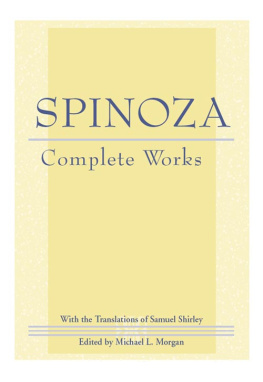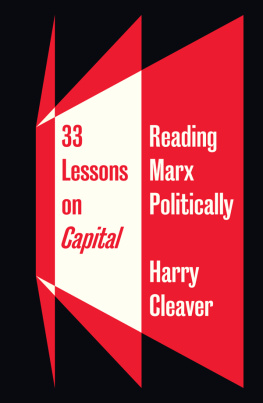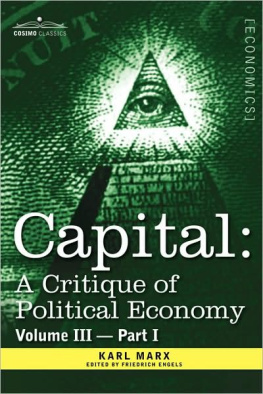Frédéric Lordon - Willing Slaves Of Capital: Spinoza And Marx On Desire
Here you can read online Frédéric Lordon - Willing Slaves Of Capital: Spinoza And Marx On Desire full text of the book (entire story) in english for free. Download pdf and epub, get meaning, cover and reviews about this ebook. year: 2014, publisher: Verso, genre: Science. Description of the work, (preface) as well as reviews are available. Best literature library LitArk.com created for fans of good reading and offers a wide selection of genres:
Romance novel
Science fiction
Adventure
Detective
Science
History
Home and family
Prose
Art
Politics
Computer
Non-fiction
Religion
Business
Children
Humor
Choose a favorite category and find really read worthwhile books. Enjoy immersion in the world of imagination, feel the emotions of the characters or learn something new for yourself, make an fascinating discovery.
- Book:Willing Slaves Of Capital: Spinoza And Marx On Desire
- Author:
- Publisher:Verso
- Genre:
- Year:2014
- Rating:3 / 5
- Favourites:Add to favourites
- Your mark:
- 60
- 1
- 2
- 3
- 4
- 5
Willing Slaves Of Capital: Spinoza And Marx On Desire: summary, description and annotation
We offer to read an annotation, description, summary or preface (depends on what the author of the book "Willing Slaves Of Capital: Spinoza And Marx On Desire" wrote himself). If you haven't found the necessary information about the book — write in the comments, we will try to find it.
Willing Slaves Of Capital: Spinoza And Marx On Desire — read online for free the complete book (whole text) full work
Below is the text of the book, divided by pages. System saving the place of the last page read, allows you to conveniently read the book "Willing Slaves Of Capital: Spinoza And Marx On Desire" online for free, without having to search again every time where you left off. Put a bookmark, and you can go to the page where you finished reading at any time.
Font size:
Interval:
Bookmark:

Translated by Gabriel Ash

First published by Verso 2014
Translation Gabriel Ash 2014
Originally published as Capitalisme, dsir et servitude
La fabrique ditions 2010
All rights reserved
The moral rights of the author have been asserted
1 3 5 7 9 10 8 6 4 2
Verso
UK: 6 Meard Street, London W1F oEG
US: 20 Jay Street, Suite 1010, Brooklyn, NY 11201
www.versobooks.com
Verso is the imprint of New Left Books
ISBN-13: 978-1-78168-160-2 (PBK)
ISBN-13: 978-1-78168-161-9 (HBK)
eISBN-13: 978-1-78168-213-5 (US)
eISBN-13: 978-1-78168-635-5 (UK)
British Library Cataloguing in Publication Data
A catalogue record for this book is available from the British Library.
Library of Congress Cataloging-in-Publication Data
A catalog record for this book is available from the Library of Congress.
Typeset in Minion Pro by Hewer Text UK Ltd, Edinburgh
Printed in the US by Maple Press
WALLACE: Not only that, Mr Fage. You have to understand the business, so that your ideas go in a specific direction the relationship between the company and the new employee must be a little bit like a marriage of love.
Michel Vinaver, The Job Application
We are taught that businesses have souls, which is surely the most terrifying news in the world.
Gilles Deleuze, Postscript on the Societies of Control
Were it as easy to control peoples minds as to restrain their tongues, every sovereign would rule securely and there would be no oppressive governments. For all men would live according to the minds of those who govern them and would judge what is true or false, or good or bad, in accordance with their decree alone. But it is impossible for one persons mind to be absolutely under anothers control. For no one can transfer to another person his natural right, or ability, to think freely and make his own judgments about any matter whatsoever, and cannot be compelled to do so. This is why a government which seeks to control peoples minds is considered oppressive
Spinoza, Theological-Political Treatise
Capitalism keeps making itself contentious. Were it not at times such a repulsive spectacle, one could almost admire the audacity with which it tramples the main tenet of the very body of thought that it flaunts as its ideological reference; for it is indeed liberalism that commands, here in Kants formulation, to act in such a way that you treat humanity, whether in your own person or in the person of any other, always at the same time as an end and never simply as a means.
tienne de La Botie reminds us how the habit of serving leads to losing sight of the very condition of servitude. to convince the many to adopt their employers desires as if they were their own and to occupy themselves in their service.
Does this power a very strange one, upon reflection really belong to them? Thanks to Marx we are well aware that it does not. Rather, it is the effect of a particular configuration of social structures: the employment relation is the double separation of the workers from both the means of production and from its products. These structures, however, do not explain everything that takes place inside capitalist organisations, a task that belongs to the psychology and sociology of work. Rather than seeking to contribute to these distinctive disciplines, this book proposes a more abstract approach, although one which may hold some useful elements for them to draw on: to combine a structuralism of relations and an anthropology of passions Marx and Spinoza.
These two have certainly met, if only through their commentators. While they are not in complete agreement, their affinities are legion, or in any case sufficiently strong that bringing them together would not run the risk of producing nonsense. The temporal paradox is that, although Marx comes after Spinoza, it is Spinoza who can now help us fill the gaps in Marx. For identifying the structures of the capitalist mobilisation of employees does not tell us what these structures run on; that is to say, it does not tell us what, concretely, makes them effective not the ghost but the engine in the machine. The Spinozist answer is affects.
Social life is just another name for the collective passionate life. Of course, this life is organised through institutional forms that introduce considerable differences, but within which affects and forces of desire continue to be the primum mobile. Recognising their deeply structured character does not therefore preclude a re-examination of the employment question through the passions, thus asking afresh how capitals few succeed in making labours many work for them, and according to which regimes of mobilisation. On the contrary, returning to this question may even make it possible to find the common ground between disparate facts such as the following: employees go to work to avoid starving; their enjoyment as consumers compensates them to a greater or lesser extent for their taxing toil; some spend all their waking hours working, and appear satisfied; others enthusiastically join in the running of the company; then, one day, they rebel (or throw themselves out of the window).
For contemporary capitalism undeniably displays a much richer landscape of passions, with much stronger contrasts, than it did in Marxs time. Intent on retaining the centrality of the confrontation between the two monoliths of capital and labour, Marxism took a long time to acknowledge that fact, not without paying a certain price. Was not the credibility of the binary class scheme considerably damaged by the historical rise of the managers, those strange employees, materially on the side of labour but symbolically on the side of capital?manager is the very model for the kind of happy workforce that capitalism would like to create regardless of the manifest contradiction that simultaneously drives capitalism, in its neoliberal configuration, to also regress towards the most brutal forms of coercion. The idea of domination could not avoid being affected by this development; approached simplistically, it is unsettled by the spectacle of the happily dominated.
Countless works have grappled with this paradox, notably within the sociological tradition indebted to Pierre Bourdieu, whose concept of symbolic violence aimed precisely at thinking through the intersections of domination and consent. Nevertheless, the (conceptual) terrain of capitalist domination remains open: how can one make sense of this concept setting aside the cases where employees are downright (and actively) terrorised when many employees appear to do more than merely adapt to their job, find little to complain about in it, and at times appear to derive real satisfaction from it? But making the dominated happy so that they forget their domination is one of the oldest and most effective ruses of the art of ruling. Under the impact of the requirements of its new productive forms, and helped by the growing sophistication of its practices of governmentality, capitalism is on the road to achieving a domination that no longer shows the familiar face of the naked iron yoke.
Of course, the sociology of work did set out to peek behind the gleaming faade of the idea of consent and expose its shortcomings, but without always asking what should be the very first question: what exactly does consent mean? This question is worth asking, since by leaving the matter unresolved one risks seeing the facts of consent (where they exist) destabilise the concepts of exploitation, alienation, and domination, concepts that Marxist critique in particular relies upon as the trusted foundations of its intellectual toolkit. Each of these concepts is perturbed by the new, motivational managerial tendencies that promise fulfilment at work and self-realisation, and that appear at times to be winning the support of employees. Testifying to that destabilising effect is the relative conceptual impoverishment that, in the absence of anything better, leads to the persistent reappearance of that trite expression, voluntary servitude. While it is no doubt a suggestive oxymoron, its flaws those owing to the very fact that it is an oxymoron come to light as soon as it passes from poetry into theory (setting aside the eponymous work).
Font size:
Interval:
Bookmark:
Similar books «Willing Slaves Of Capital: Spinoza And Marx On Desire»
Look at similar books to Willing Slaves Of Capital: Spinoza And Marx On Desire. We have selected literature similar in name and meaning in the hope of providing readers with more options to find new, interesting, not yet read works.
Discussion, reviews of the book Willing Slaves Of Capital: Spinoza And Marx On Desire and just readers' own opinions. Leave your comments, write what you think about the work, its meaning or the main characters. Specify what exactly you liked and what you didn't like, and why you think so.













